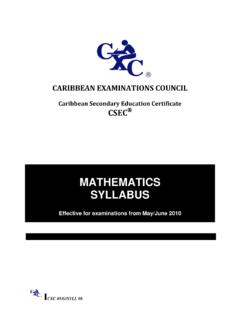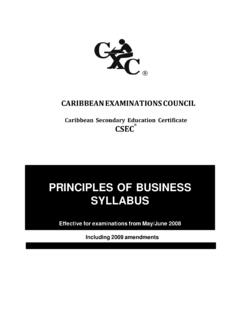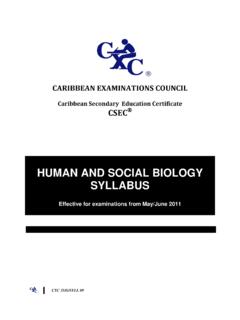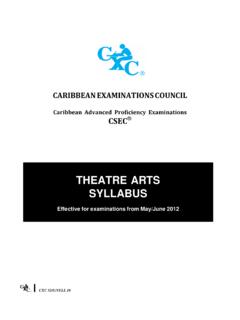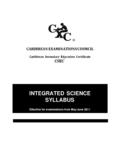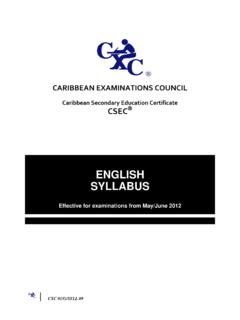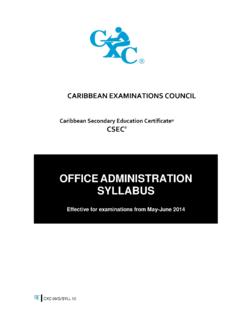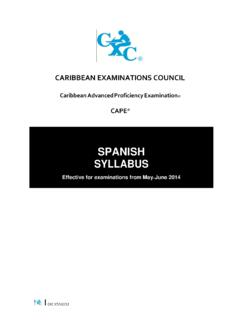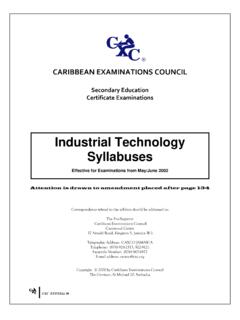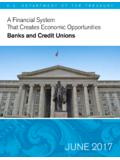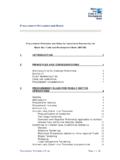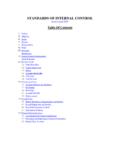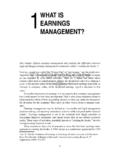Transcription of Principles of Accounts - CXC
1 CXC 10/G/SYLL 06 CARIBBEAN EXAMINATIONS COUNCIL Caribbean Secondary Education Certificate CSEC Principles OF Accounts SYLLABUS Effective fo r examinations from May/June 2008 CXC 10/G/SYLL 06 ii Published by the Caribbean Examinations Council All rights reserved. No part of this publication may be re pr oduced, stored in a retrieval system, or transmitted in any form, or by any means electronic, photocopying, recording or otherwise without prior permission of the aut hor or publisher. Correspondence related to the syllabus should be addressed to: The Pro- Registrar Caribbean Examinations Council Caenwood Centre 37 Arnold Road, Kingston 5, Jamaica, Telephone: (876) 630-5200 Facsimile Number: (876) 967- 4972 E-mail address: cxc Website: Copyright 2006, by Caribbean Examinations Council The Garrison, St Michael BB14038, Barba dos CXC 10/G/SYLL 06 Contents AIMS.
2 1 GENERAL OBJECTIVES ..1 - 2 ORGANIZATION OF THE SYLLABUS .. 2 SUGGESTED TIME-TABLE ALLOCATION .. 3 CERTIFICATION AND DEFINITION OF PROFILE DIMENSIONS .. 3 FORMAT OF THE EXAMINATIONS ..4 - 5 SECTION 1 INTRODUCTION TO Principles OF Accounts ..6 - 7 SECTION 2 THE CLASSIFIED BALANCE SHEET .. 8 SECTION 3 BOOKS OF ORIGINAL ENTRY ..9 - 10 SECTION 4 LEDGERS AND THE TRIAL BALANCE ..11 -12 SECTION 5 THE PREPARATION AND ANALYSIS OF financial STATEMENTS OF THE SOLE-TRADER ..13 - 14 SECTION 6 END OF PERIOD ADJUSTMENTS ..15 - 16 SECTION 7 CONTROL SYSTEMS ..17 - 18 SECTION 8 INCOMPLETE RECORDS ..19 SECTION 9 ACCOUNTING FOR PARTNERSHIPS.
3 20 - 21 SECTION 10 ACCOUNTING FOR CORPORATIONS (Limited Lia bility Companies) ..22 - 23 SECTION 11 ACCOUNTING FOR CO-OPERATIVE SOCIETIES ..24 SECTION 12 ACCOUNTING FOR NON-TRADING (NON PROFIT) ORGANIZATIONS ..25 SECTION 13 MANUFACTURING Accounts ..26 CXC 10/G/SYLL 06 SECTION 14 PAYROLL 27 GUIDELINES FOR THE CONDUCT OF THE SCHOOL-BASED ASSESSMENT IN Principles OF Accounts .. 28 32 GUIDELINES FOR THE ALTERNATIVE TO THE SCHOOL-BASED ASSESSMENT .. 33 REGULATIONS FOR PRIVATE CANDIDATES .. 34 REGULATIONS FOR RESIT CANDIDATES .. 34 REGULATIONS FOR THE JANUARY SITTING .. 34 The Pri nciples of Business syllabus (CXC 10/0/SYLL 96) was revised in 2006 for first examination in 2008.
4 Teaching is expected to commence on the revised syllabus in Septe mber 2006. First Publis hed in 1978 Revised in 1990, 1998, 2006 and 2013 Please check the websit e, for updates on CXC s syllabuses. Pri nciples of Accounts Syll abus RATI ONALE Accounting is the financial information system that provi des relevant informati on to those who manage or use economic resources or engage in other economic activity. Principles of Accounts is a course of st udy that provides an introduction to the pri nciples and techniques that accountants employ in measuri ng, processing, evaluating and communicating information about the financial performance and position of a business.
5 This course in Pri nciples of Accounts helps students to develop an understanding of a ra nge of theoretical and practical techniques used in accounting. It helps to develop skills that should enable them to participate more effectively and responsibly in today s business environment, to improve the management of personal financial activities, such as, budgeting, savings and investment. In additi on, this course prepares students for post-secondary and professional studies in accounting. The syllabus also seeks to instill tenets of the Ideal Caribbean as articulated by the CARICOM Caribbean Education Task Force (CTF) and adopted by the CARICOM Heads of Government at their 18th Summit.
6 To this end the syllabus contains objectives and content intended to nurture and improve students multiple literacy skills, as well as their management, economic and entrepreneurial skills and positive work ethic. In addition, in keeping with the UNESCO Pillars of Learning, on completion of this course of study students will learn to know, to be, to do, and to live together. AIMS The syllabus aims to: 1. introduce fundamental pri nciples and practices of accounting; 2. develop skills and attitudes useful in a dynamic business environment; 3. provi de a foundation for furt her st udies in accounting; 4.
7 Provi de an acceptable level of competence for entry-level empl oyment. GENERAL OBJECTIVES On completion of the syllabus, students should: 1. develop skills in applyi ng accounting pri nciples and procedures to business sit uations; CXC 10/G/SYLL 06 1 2. appreciate the importance of accountability in both public and private organizations; 3. grasp the significance of accounting as a tool for effecting control; 4. appreciate the use of accounting practice as a tool for efficient business management; 5. have the ability to identify and interpret financial data that will facilitate proper decision-making by users of accounting information; 6.
8 Develop an awareness of the role and impact of technology in accounting. ORGANIZATION OF THE SYLLABUS The syllabus is arranged in 14 sections, consisting of specific objectives and related content. SECTION 1 - INTRODUCTION TO Principles OF Accounts SECTION 2 - THE CLASSIFIED BALANCE SHEET SECTION 3 - BOOKS OF ORIGINAL ENTRY SECTION 4 - LEDGERS AND THE TRIAL BALANCE SECTION 5 - THE PREPARATION AND ANALYSIS OF financial STATEMENTS OF THE SOLE-TRADER SECTION 6 - END OF PERIOD ADJUSTMENTS SECTION 7 - CONTROL SYSTEMS SECTION 8 - INCOMPLETE RECORDS SECTION 9 - ACCOUNTING FOR PARTNERSHIPS SECTION 10 - ACCOUNTING FOR CORPORATIONS (LIMITED LIABILITY COMPANIES) SECTION 11 - ACCOUNTING FOR CO-OPERATIVE SOCIETIES SECTION 12 - ACCOUNTING FOR NON-TRADING (NON PROFIT)
9 ORGANIZATIONS SECTION 13 - MANUFACTURING Accounts SECTION 14 - PAYROLL ACCOUNTING CXC 10/G/SYLL 06 2 SUGGESTED TI ME TABLE ALLOCATI ON It is recommended that a minimum of five 40-minute periods per week (over a two year period) or the equivalent should be allocated to the syllabus. CERTI FICATION AND DEFINITION OF PROFILE DIMENSIONS The CSEC Pri nciples of Accounts syllabus will be examined at General Proficiency only. Candidates will be awarded an overall grade on a six-point scale. In additi on to the overall grade, candidates performance will be re ported by a letter grade under profile dimensions of Knowledge, Application and Interpretation.
10 (i) Knowledge The ability to: (a) state, list or identify accounting concepts, terms and pri nciples; (b) define and explain accounting concepts, pri nciples, theories and procedures; (c) demonstrate an understanding of basic accounting concepts, conve ntions and pri nciples. (ii) Application The ability to: (a) apply accounting concepts and pri nciples to analyze iss ues; (b) apply accounting concepts, pri nciples and theories to solve accounting problems in various sit uations. (iii) Interpretation The ability to: (a) select, organize and interpret accounting data presented in a variety of forms; (b) organize and present, logically and effectively, accounting ideas and arguments using verbal, graphical and numerical forms of communication.
